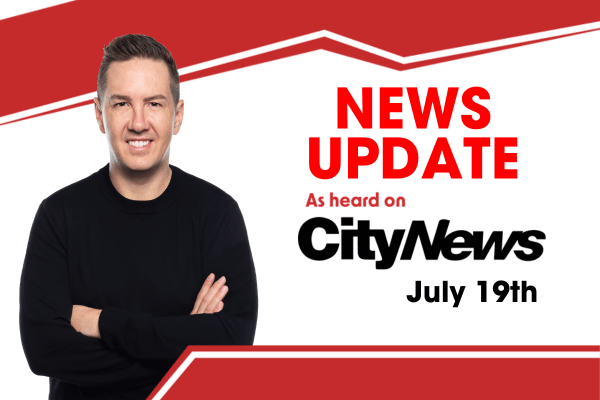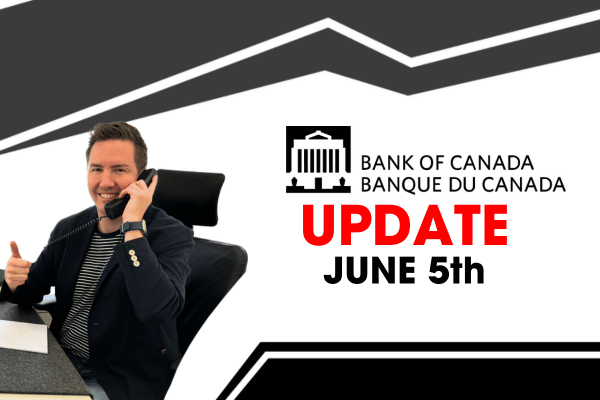Clinton joins Todd Veinotte for this special news update on a Toronto news announcement about a potential big drop in prices in the coming months. Clinton gives his take on what that means for Nova Scotians, and gives refinance advice.
Rick Howe: Rate debate. Fixed versus variable.
Fixed versus variable
The age-old rate debate. Fixed versus variable. Don’t feel like listening? Check out the audio transcript below.
This is a five-minute business builder with Rick Howe, where your business comes first, on News 95.7.
Talking about the rate debate
Rick Howe: [00:00:09] It’s 12:22 and from time to time we invite members of the business community to join me in the studio. And back with us, this afternoon is Senior Mortgage Adviser Clinton Wilkins. Hi, Clinton.
Clinton Wilkins: [00:00:17] Thanks for having me today, Rick.
Rick Howe: [00:00:19] Thank you for coming back with us here this afternoon. Today, we’re going to talk about mortgage rates: fixed versus variable. What’s the difference and what’s best if I’m a relatively new homebuyer, for example. Does it make a difference, what if I’m a veteran homebuyer? Does that make a difference as well?
Clinton Wilkins: [00:00:35] I think historically people do better in a variable rate. But right now we’re in a little bit of an odd time, just like the weather is outside today. Normally variable is lower. Right now, though, the fixed rates are lower than the variable. And we’ve seen a little bit of a shift in the marketplace because the prime rate has still stayed the same or the last few meetings with the Bank of Canada. But the fixed rates have been going down because of the bond yield. So right now, you can get a really good fixed rate in the mid 2’s, still like 2.59, 2.69, 2.79. In terms of a fixed-rate.
More about variable rates
Rick Howe: [00:01:08] How does that compare to a variable?
Clinton Wilkins: [00:01:10] I would say some of the best variable rates are about 3 percent.
Rick Howe: [00:01:13] Really?
Clinton Wilkins: [00:01:14] Yeah. So normally the variables always lower and fix higher. As you can imagine. You have to take on some risk, obviously if you’re taking a variable rate.
Rick Howe: [00:01:22] So why is it flipped around like that?
Clinton Wilkins: [00:01:23] Well, they move completely independently of each other. The variable rate is tied to the Bank of Canada overnight rate, which turns into the bank’s prime rate and then they offer a discount on prime. But right now, with the way that the fixed rates have moved, they move with the bond yields. And, you know, they’ve really driven those fixed-rate pricing down. So we’re in a little bit of an odd time.
What is your recommendation?
Rick Howe: [00:01:45] So what’s your recommendation then? If I’m buying a home here, do I go right now with a fixed rate or do I try the variable knowing at some point down the road, one or the other is going to make a change here?
Clinton Wilkins: [00:01:54] Historically, people do better in the variable, but you need to have the stomach to say, yes, I’m willing to pay more today with the future hope that it’s going to be cheaper down the road. The Bank of Canada is meeting at the end of the month. So, you know, we’ll have some news then. And the economists are projecting that we could potentially see a couple decreases in the prime rate into 2020.
Rick Howe: [00:02:13] How would that impact both the variable and the fixed rate?
Clinton Wilkins: [00:02:15] It won’t impact fixed because they move independently, but it would impact the people on a variable rate mortgage. It would be that mortgage will become cheaper when the prime rate goes down. You know, one of the big pros with a variable is if you don’t know, you’re going to live through your term. If you might break the term early. Having a variable makes a lot of sense for consumers because you’re guaranteed that you’re only going to have a penalty of three months’ interest to get out.
The other really great pro with the variable is you can always lock it into a fixed rate and there’s no cost. So there are some pros to the variable that you don’t have with a fixed. But if you really want to know what your payments are going to be every month and you want to have stability and you may lose sleep at night, I think fixed is great. It’s not for everyone. But, you know, for a certain percentage of consumers, the fixed rate is right.
Taking a gamble on rates
Rick Howe: [00:02:59] But if you’re a bit of a gambling person, it might be wise gambling?
Clinton Wilkins: [00:03:02] I think you’ll hypothetically do better in the variable today. It’s more expensive, but I think over time it will be probably at least at the same or cheaper than the fixed. And there are some pros. So I think everybody’s situation is a little bit different. And I think coming to an unbiased mortgage professional like me, we can look at your situation and make a recommendation that would make the most sense.
And no matter if you’re buying a home or renewing or refinancing, there are rate options. So, you know, sometimes fixed is good for some people and sometimes variable is good for other people. And I think that just looking at your scenario individually makes a lot of sense.
Rick Howe: [00:03:34] Because right now, today here as we speak, the housing market in this atrium of ours is hot, hot, hot.
The Halifax market is hot
Clinton Wilkins: [00:03:40] It’s so hot. And I think we just before we went on the air, I was just telling Rick that we had a client that bought a home in the north end and the property went for a hundred thousand dollars more, over the listing price.
Rick Howe: [00:03:48] More!Over listing price, wow!
Clinton Wilkins: [00:03:50] Wow. What do we think this is, Toronto? I don’t know. Maybe it is. There’s no other place that I would rather live and do business than in Halifax. You know, I think we’re seeing a lot of positive migration and we think and the economists are saying that in Halifax, our population is going to grow by 20 percent over the next five years. We don’t have the housing stock to support that. So there’s only one place for these prices to go.
Rick Howe: [00:04:15] and that’s up.
Halifax has a lack of inventory
Clinton Wilkins: [00:04:15] That’s up. And there’s not a lot of inventory on the market and it’s moving very quickly. And, you know, people are asking me all the time: should I wait for it to become more of a buyer’s market? I don’t know if that’s ever going to happen, because I think we’re in a supply issue now that is just going to keep on driving the prices up. Do I ever think that it’s going to be Toronto or Vancouver pricing? No, because we’ve had very slow growth, we’ve had 1,2,3% growth. But we’ve never had a boom here in Halifax, but we haven’t had a bust either.
There’s lots of areas that the prices go up and they go down, like Newfoundland is really hurting. Alberta – Let’s not even get into that. We’ve had a very stable market here and it’s a very safe bet on real estate. But, you know, we are ready for, I think, a boom. And I think that we could potentially see some double digit growth in terms of price. I think it’s an act now or may potentially act never situation in Halifax.
Rick Howe: [00:05:06] You’ll be on with Todd this weekend, will you?
Clinton Wilkins: [00:05:07] I’ll be on with Tod at 10am on Saturday and we’re gonna take calls live on the air. So if you’ve any questions about fixed rates or variable rates or you want to talk about the market, certainly tune in and we’d love to have your calls, It’s all about hopefully we’re giving lots of great information and we love helping people!
Rick Howe: [00:05:24] All right and I appreciate it! Appreciate your joining us here again this afternoon. Thank you, Clinton.
Clinton Wilkins: [00:05:28] Thanks for having me, Rick.
Rick Howe: [00:05:28] That is Clinton Wilkins!
If you have any questions about Homeownership or what that means for your situation, get in touch with us here.


